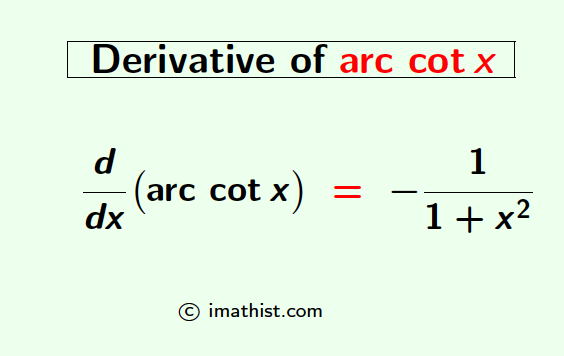The derivative of arc(cotx) is equal to -1/(1+x2). In this post, we will learn how to differentiate cot inverse x.
The derivative formula of cot-1x is given by d/dx (cot-1x) = -1/(1+x2).

What is the derivative of arc cotx?
Answer: The derivative of arccotx is -1/(1+x2).
Solution:
Let y = arc cotx …(∗)
As we need to find the derivative of arccot x, so we have to calculate dy/dx. From (∗) we get that
y = cot-1x
⇒ coty = x …(∗∗)
We now differentiate both sides of (∗∗) with respect to x. So we obatin that
$\dfrac{d}{dx}$(coty) = $\dfrac{dx}{dx}$
⇒ $- \text{cosec}^2 y \dfrac{dy}{dx}$ =1
⇒ $\dfrac{dy}{dx}$ = $-\dfrac{1}{\text{cosec}^2 y}$
Now, using the trigonometric formula cosec2y = 1+cot2y, we deduce that
$\dfrac{dy}{dx}$ = – $\dfrac{1}{1+\cot^2 y}$
So $\dfrac{dy}{dx}$ = – $\dfrac{1}{1+x^2}$ as coty = x by (∗∗)
Thus, the derivative of arc cotx, that is, the differentiation of cot inverse x is equal to – 1/(1+x2).
Differentiation of cot inverse x
To find the derivative of cot inverse x, we will use the differentiation of tan inverse x. We know that
tan-1x + cot-1x = π/2
Differentiating both sides of the above equation, we get that
$\dfrac{d}{dx}$(tan-1x) + $\dfrac{d}{dx}$(cot-1x) = 0 as we know that the derivative of a constant is zero and π/2 here is a constant.
⇒ 1/(1+x2) + $\dfrac{d}{dx}$(cot-1x) =0
⇒ $\dfrac{d}{dx}$(cot-1x) = -1/(1+x2).
Thus, we have proven that the derivative of arccot x is -1/(1+x2).
Question Answer
Q1: What is the derivative of arc cot 2x?
Answer:
Note that arc(cot2x) = cot-1(2x).
Put t=2x.
So dt/dx=2.
Now, by the chain rule of differentiation, the derivative of arc cot(2x) will be equal to
| $\dfrac{d}{dx}(\text{arc} \cot 2x)$ $=\dfrac{d}{dt}(\text{arc} \cot t) \times \dfrac{dt}{dx}$ ⇒ $\dfrac{d}{dx}(\text{arc} \cot 2x)$ $=\dfrac{-1}{1+t^2} \times 2$ as t=2x. ⇒ $\dfrac{d}{dx}(\text{arc} \cot 2x)$ $=- \dfrac{2}{1+4x^2}$. |
So the derivative of cot inverse 2x is equal to -2/(1+4x2).
ALSO READ
FAQs
Q1: If y=arc cotx, then find dy/dx?
Answer: If y=arc cotx, then differentiating both sides we get that dy/dx = -1/(1+x2).
Q2: If y=cot-1x, then find dy/dx?
Answer: If y=cot-1x, then differentiating both sides dy/dx is equal to -1/(1+x2).